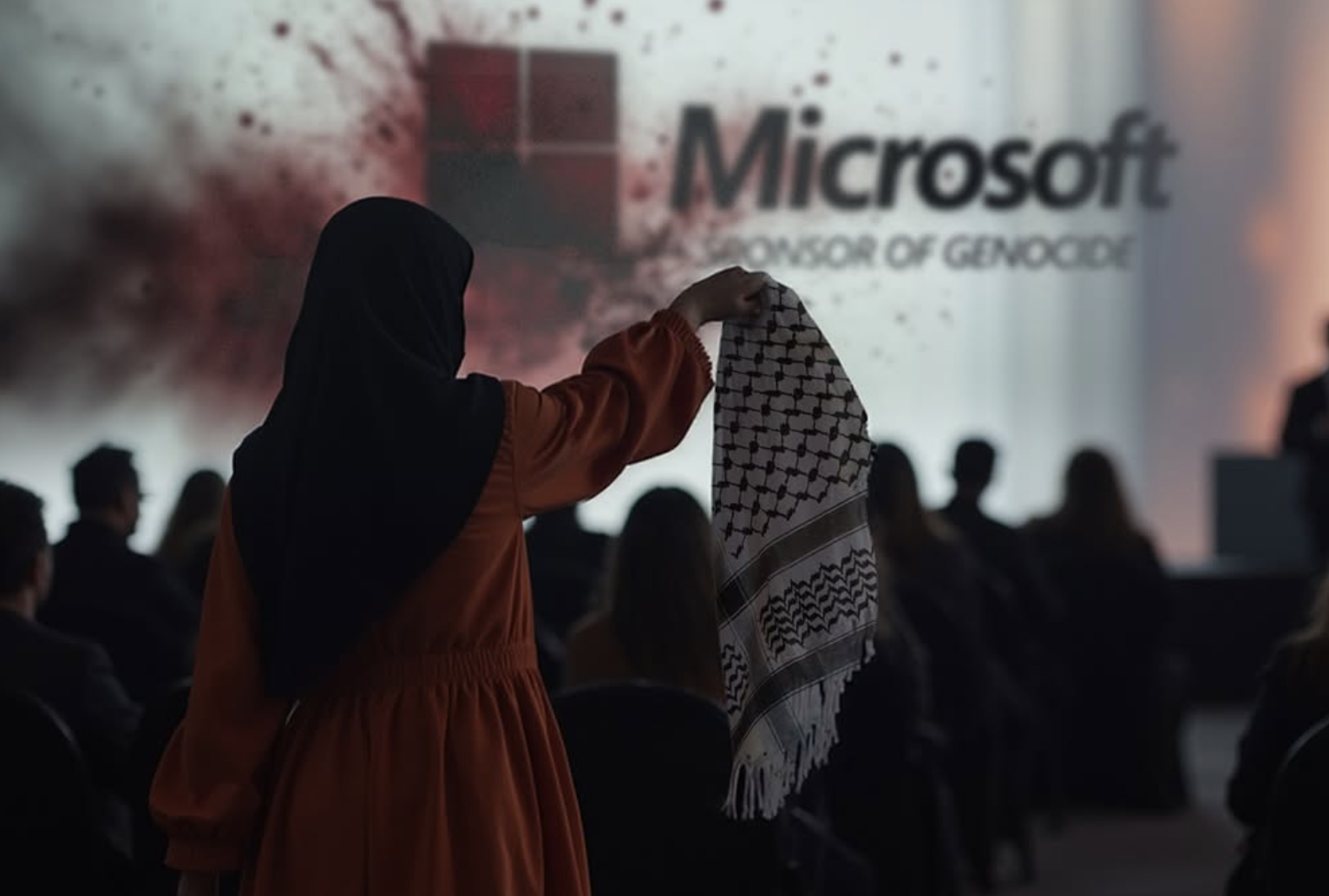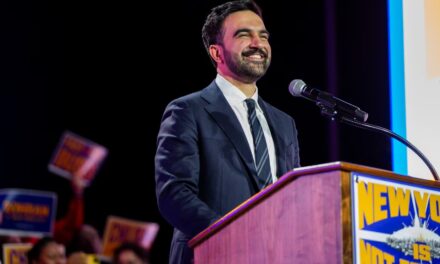Photo Credit: @in.visualart on Instagram
Microsoft’s 50th anniversary celebration was meant to be a triumphant moment – a nostalgic nod to the past and a confident step into the future. But instead of a flawless showcase of innovation, the company found itself confronted with a very different kind of legacy, one rooted not in software but in silence, complicity, and moral failure.
As Microsoft’s three most powerful leaders – current CEO Satya Nadella, former CEO Steve Ballmer, and co-founder Bill Gates – took the stage, the mood shifted abruptly. Vaniya Agrawal, a young Indian American software engineer in the company’s artificial intelligence division, stood up and accused these leaders of enabling the mass murder of Palestinians in Gaza.
“50,000 Palestinians in Gaza have been murdered with Microsoft technology. How dare you? Shame on all of you for celebrating on their blood,” she declared before security pushed her out.
Earlier that day, another Microsoft employee, Harvard graduate and Moroccan American engineer, Ibtihal Aboussad, disrupted a keynote address by AI chief Mustafa Suleyman. “How dare you celebrate when Microsoft is killing children,” she shouted, pointing to the company’s direct involvement in supplying AI technologies used by the Israeli military. Her protest wasn’t random, it was born of long-suppressed frustration after more than a year of failed internal efforts to raise ethical concerns.
By the following week, both women were fired.
Their courage, however, has only amplified. Their words now echo far beyond the walls of Microsoft’s Redmond campus, and their example serves as both an indictment of the limits of institutional diversity and a rallying call for moral clarity.
This wasn’t simply a case of workplace unrest. It was a reckoning. These employees weren’t demanding higher pay or better perks. They were demanding that their labor not be used to power war crimes.
An Associated Press investigation earlier this year revealed that the Israeli Defense Forces was using Microsoft and OpenAI’s AI technologies to conduct military operations in Gaza and Lebanon. The technologies facilitated everything from target selection to surveillance infrastructure to real-time battlefield analysis. Microsoft’s cloud services, via Azure, played a central role in processing massive data sets used to locate targets, often with lethal consequences.
The report confirmed what many feared: AI tools developed for “empowering humanity” were being weaponized. Additionally,, internal company documents showed that Microsoft had a $133 million contract with Israel’s Ministry of Defense, and that Israeli military usage of Microsoft services increased by 200 times following the events of Oct. 7, 2023. This wasn’t accidental. This was business.
Microsoft, like many other major corporations, is proud of its diversity, equity, and inclusion (DEI) efforts. It touts its multicultural teams, its employee resource groups, and its global reach. But as both Aboussad and Agrawal discovered, this inclusion has limits.
For over a year, Aboussad and her colleagues attempted to raise concerns through internal channels. Arab, Palestinian, and Muslim employees were repeatedly sidelined, their criticisms ignored or labeled disruptive. Some were disciplined simply for holding vigils or wearing symbolic pins. Others were quietly pushed out.
In an internal email circulated shortly before her public protest, Aboussad wrote, “When I moved to the AI Platform, I was excited to contribute to cutting-edge technology for the good of humanity. I was not informed that Microsoft would sell my work to the Israeli military to spy on and murder journalists, doctors, aid workers, and entire civilian families.”
Her experience mirrors a pattern seen across sectors. Institutions eager to showcase diversity often do so with unspoken conditions: representation is welcome only if it’s apolitical. Advocacy is tolerated only if it doesn’t threaten power.
In recent years, there has been a well-meaning push to ensure that marginalized communities are “represented” in elite institutions. But what good is a seat at the table if you’re asked to remain silent once you sit down?
This kind of conditional inclusion is not progress. It’s performance. It turns diversity into a box-checking exercise, one that may elevate individual careers but does little to protect the communities those individuals seemingly represent.
In some cases, representation can be worse than silence. When people see someone “like them” in positions of power, they may assume their voices are being heard. It creates the illusion of accountability while suppressing actual dissent. It convinces people outside the room that progress is being made, even when the room is built on compromise and silence.
This is the danger of tokenism. It transforms what should be a platform for advocacy into a tool for pacification.
Aboussad’s treatment is a case study in how institutions neutralize dissent from within. Despite working at the cutting edge of AI, contributing to some of Microsoft’s most high-profile projects, she was deemed expendable the moment she challenged her employer’s moral direction.
Their dismissal was framed as a response to “disruption” and “misconduct.” But let’s be clear: their only disruption was forcing a company to reckon with the consequences of its actions.
If DEI means anything, it must include the right to speak out. It must protect, not punish, those who raise concerns rooted in basic human rights and international law. And yet, too often, companies use DEI as a shield, parading their inclusive hiring practices while silencing those who try to make that inclusion meaningful.
Corporate complicity in state violence is not new. During the Holocaust, IBM provided the Nazi regime punch card systems, tools that facilitated surveillance, registration, and logistical coordination of genocide. The company profited while claiming ignorance. Decades later, it remains a case study in ethical failure.
In South Africa, companies that supported the Apartheid regime faced global boycotts and lasting reputational damage. Eventually, many of them disavowed their roles, but only after immense pressure from activists, workers, and global civil society.
Today, companies like Microsoft face a different kind of accountability. Every action is recorded, every leak can go viral, and every employee has the potential to become a whistleblower. And the younger generation is watching closely. They are generally more informed, more connected, and far less willing to separate technology from ethics.
Aboussad and Agrawal didn’t just walk away from high-paying jobs at a global tech giant. They walked away with their integrity intact. And they will not be unemployed for long.
Educated at elite institutions, trained in high-demand fields, and armed with a clarity of conscience, these women represent the kind of talent that principled organizations should be proud to welcome. They are exactly the kind of leaders the future needs – those who understand that success without ethics is failure by another name.
Their story has already inspired others. The Microsoft workers-led No Azure for Apartheid campaign demanding an end to the company’s complicity in Israel’s apartheid and genocide has gained global traction. Conversations are shifting. Engineers are questioning whether they want to “write code that kills.” Consumers are asking whether convenience is worth complicity. And companies are being forced to answer not just to shareholders, but to society.
These events are also moments for Muslims and ethics-favoring investors to question where their funds are being invested. Indeed, it is possible for employees to even transfer their retirement accounts from unethical to ethical funds and bonds.
Every person has a role in shaping the future. For some, that may mean working within flawed institutions and pushing for reform. For others, it may mean stepping away when conscience demands it. But it must be noted that silence is never neutral. One either upholds injustice or helps dismantle it.
True progress demands that we move beyond symbolic gestures. It requires building institutions that not only include marginalized voices but also empower them to lead with conviction even when that leadership makes others uncomfortable.
This is especially true in fields like technology, where the tools that we build shape the world we live in. We cannot afford to separate technical excellence from ethical responsibility. The two must walk hand in hand.
Aboussad and Agrawal exemplify what it means to lead with integrity. In an age when careers are built on personal branding and institutional loyalty, they chose principle over comfort.
They reminded us that speaking up matters. That resistance from within is powerful. That representation is only valuable if it carries with it a responsibility to speak the truth.
They didn’t just resign. They refused to be complicit. And in doing so, they reignited a conversation about what real leadership, real inclusion, and real progress look like.
May their courage ripple far and wide. And may the next generation of technologists, lawyers, workers, and leaders follow their lead not just into rooms of power, but into the work of transforming them.
Faisal Kutty, J.D., LL.M., is a lawyer, law professor, and regular contributor to The Toronto Star and Newsweek. You can follow him on X @faisalkutty.
Want more like this? Subscribe to the Islamic Horizons magazine and support authentic journalism by Muslims for Muslims.
By Faisal Kutty, J.D., LL.M.














